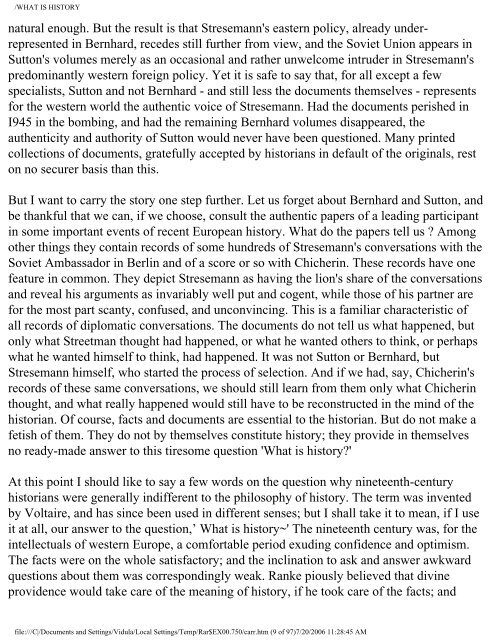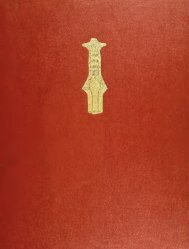What is History / by Edward Hallett Carr - Universal History Library
What is History / by Edward Hallett Carr - Universal History Library
What is History / by Edward Hallett Carr - Universal History Library
Create successful ePaper yourself
Turn your PDF publications into a flip-book with our unique Google optimized e-Paper software.
WHAT IS HISTORY<br />
natural enough. But the result <strong>is</strong> that Stresemann's eastern policy, already underrepresented<br />
in Bernhard, recedes still further from view, and the Soviet Union appears in<br />
Sutton's volumes merely as an occasional and rather unwelcome intruder in Stresemann's<br />
predominantly western foreign policy. Yet it <strong>is</strong> safe to say that, for all except a few<br />
special<strong>is</strong>ts, Sutton and not Bernhard - and still less the documents themselves - represents<br />
for the western world the authentic voice of Stresemann. Had the documents per<strong>is</strong>hed in<br />
I945 in the bombing, and had the remaining Bernhard volumes d<strong>is</strong>appeared, the<br />
authenticity and authority of Sutton would never have been questioned. Many printed<br />
collections of documents, gratefully accepted <strong>by</strong> h<strong>is</strong>torians in default of the originals, rest<br />
on no securer bas<strong>is</strong> than th<strong>is</strong>.<br />
But I want to carry the story one step further. Let us forget about Bernhard and Sutton, and<br />
be thankful that we can, if we choose, consult the authentic papers of a leading participant<br />
in some important events of recent European h<strong>is</strong>tory. <strong>What</strong> do the papers tell us ? Among<br />
other things they contain records of some hundreds of Stresemann's conversations with the<br />
Soviet Ambassador in Berlin and of a score or so with Chicherin. These records have one<br />
feature in common. They depict Stresemann as having the lion's share of the conversations<br />
and reveal h<strong>is</strong> arguments as invariably well put and cogent, while those of h<strong>is</strong> partner are<br />
for the most part scanty, confused, and unconvincing. Th<strong>is</strong> <strong>is</strong> a familiar character<strong>is</strong>tic of<br />
all records of diplomatic conversations. The documents do not tell us what happened, but<br />
only what Streetman thought had happened, or what he wanted others to think, or perhaps<br />
what he wanted himself to think, had happened. It was not Sutton or Bernhard, but<br />
Stresemann himself, who started the process of selection. And if we had, say, Chicherin's<br />
records of these same conversations, we should still learn from them only what Chicherin<br />
thought, and what really happened would still have to be reconstructed in the mind of the<br />
h<strong>is</strong>torian. Of course, facts and documents are essential to the h<strong>is</strong>torian. But do not make a<br />
fet<strong>is</strong>h of them. They do not <strong>by</strong> themselves constitute h<strong>is</strong>tory; they provide in themselves<br />
no ready-made answer to th<strong>is</strong> tiresome question '<strong>What</strong> <strong>is</strong> h<strong>is</strong>tory?'<br />
At th<strong>is</strong> point I should like to say a few words on the question why nineteenth-century<br />
h<strong>is</strong>torians were generally indifferent to the philosophy of h<strong>is</strong>tory. The term was invented<br />
<strong>by</strong> Voltaire, and has since been used in different senses; but I shall take it to mean, if I use<br />
it at all, our answer to the question,’ <strong>What</strong> <strong>is</strong> h<strong>is</strong>tory~' The nineteenth century was, for the<br />
intellectuals of western Europe, a comfortable period exuding confidence and optim<strong>is</strong>m.<br />
The facts were on the whole sat<strong>is</strong>factory; and the inclination to ask and answer awkward<br />
questions about them was correspondingly weak. Ranke piously believed that divine<br />
providence would take care of the meaning of h<strong>is</strong>tory, if he took care of the facts; and<br />
file:///C|/Documents and Settings/Vidula/Local Settings/Temp/Rar$EX00.750/carr.htm (9 of 97)7/20/2006 11:28:45 AM







